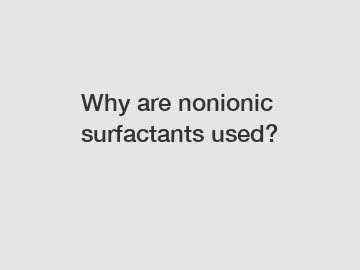Mar. 22, 2024
Nonionic surfactants are widely used in various industries for their unique properties and benefits. These surfactants do not have any charged groups in their molecular structure, unlike anionic or cationic surfactants. This lack of charge gives nonionic surfactants some distinct advantages, making them preferred in many applications. In this article, we will explore why nonionic surfactants are used and their benefits.
**Versatility**.
Nonionic surfactants are known for their versatility, making them suitable for a wide range of applications. Due to their lack of charge, they are compatible with both acidic and alkaline solutions. This versatility allows nonionic surfactants to be used in various industries, such as personal care, food and beverage, agriculture, and pharmaceuticals. In addition, nonionic surfactants are stable over a wide range of pH levels, temperatures, and salinity, making them ideal for diverse applications.

**Mildness**.
One of the key reasons why nonionic surfactants are used is their mildness. These surfactants are gentle on the skin and have low irritancy, making them ideal for use in personal care products such as shampoos, body washes, and facial cleansers. Nonionic surfactants are less likely to cause skin irritation or allergic reactions compared to anionic or cationic surfactants, making them suitable for sensitive skin types.
**Low foam**.
Nonionic surfactants are also known for their low foaming properties. This makes them ideal for use in applications where excessive foam is undesirable, such as in certain industrial processes, agriculture, or detergents for high-efficiency washing machines. The low foaming nature of nonionic surfactants allows for better penetration and cleaning without the need for excessive rinsing, saving time and water.
**Compatibility with hard water**.
Another advantage of nonionic surfactants is their compatibility with hard water. Hard water contains high levels of minerals like calcium and magnesium, which can interfere with the performance of traditional anionic surfactants. Nonionic surfactants are not affected by the presence of hard water ions, making them more effective in cleaning applications where hard water is a concern.
**Biodegradability**.
Nonionic surfactants are generally more biodegradable than anionic or cationic surfactants. This environmental advantage makes them a preferred choice in applications where sustainability and eco-friendliness are priorities. Nonionic surfactants break down more readily in the environment, reducing their impact on water systems and aquatic life compared to other types of surfactants.
**Conclusion**.
In conclusion, nonionic surfactants are used for their versatility, mildness, low foam, compatibility with hard water, and biodegradability. These surfactants offer a wide range of benefits across various industries, making them a preferred choice for many applications. Whether in personal care products, industrial processes, or agricultural applications, nonionic surfactants continue to play a crucial role in enhancing performance and minimizing environmental impact.
If you have any questions about nonionic surfactants or would like to learn more about their applications, feel free to contact us.
Want more information on Anionic Surfactant Example, Surfactant Manufacturer, Castor Oil Phosphate? Feel free to contact us.
Previous: A Guide to Understanding Surfactants
Next: Is the Surfactant Mechanism the Key to Environmental Sustainability?
If you are interested in sending in a Guest Blogger Submission,welcome to write for us!
All Comments ( 0 )